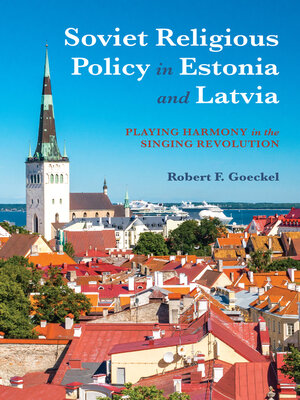Soviet Religious Policy in Estonia and Latvia
ebook ∣ Playing Harmony in the Singing Revolution
By Robert F. Goeckel

Sign up to save your library
With an OverDrive account, you can save your favorite libraries for at-a-glance information about availability. Find out more about OverDrive accounts.
Find this title in Libby, the library reading app by OverDrive.



Search for a digital library with this title
Title found at these libraries:
| Library Name | Distance |
|---|---|
| Loading... |
At the intersection of faith, culture and politics, this in-depth study examines the effects of Soviet religious policy in Baltic states after WWII.
While Russia was a predominantly Orthodox country, the Baltic states it annexed after the Second World War—such as Estonia and Latvia—featured Lutheran and Catholic churches as the state religion. Based on extensive research into official Soviet archives, some of which are no longer available to scholars, Robert Goeckel explores how central religious policy accommodated these differing traditions and the extent to which these churches either reflected or subverted nationalist ideals.
Goeckel argues that national cultural affinity with Christianity helped to provide a basis for the eventual challenge to the USSR. The Singing Revolution restored independence to Estonia and Latvia, and while Catholic and Lutheran churches may not have played a central role in this restoration, Goeckel shows how they nonetheless played harmony.
While Russia was a predominantly Orthodox country, the Baltic states it annexed after the Second World War—such as Estonia and Latvia—featured Lutheran and Catholic churches as the state religion. Based on extensive research into official Soviet archives, some of which are no longer available to scholars, Robert Goeckel explores how central religious policy accommodated these differing traditions and the extent to which these churches either reflected or subverted nationalist ideals.
Goeckel argues that national cultural affinity with Christianity helped to provide a basis for the eventual challenge to the USSR. The Singing Revolution restored independence to Estonia and Latvia, and while Catholic and Lutheran churches may not have played a central role in this restoration, Goeckel shows how they nonetheless played harmony.







